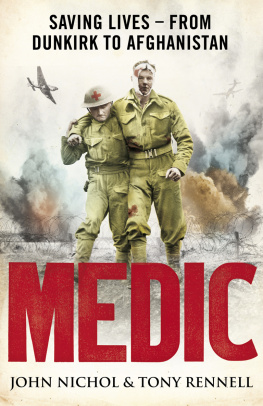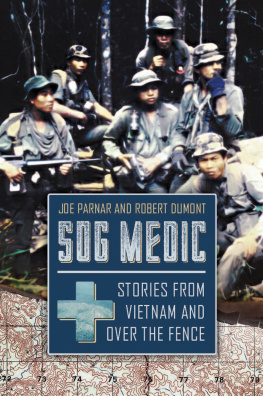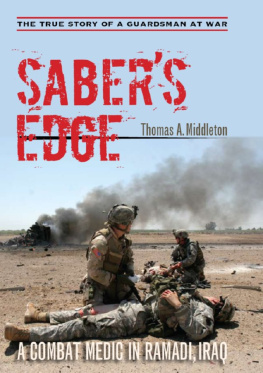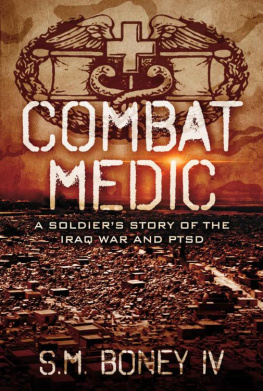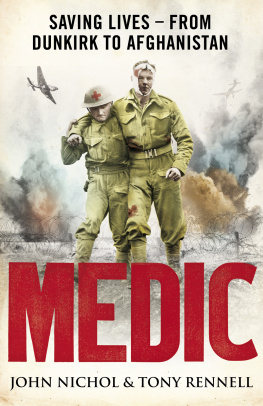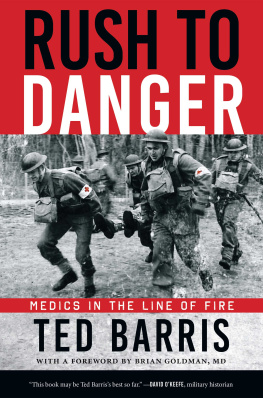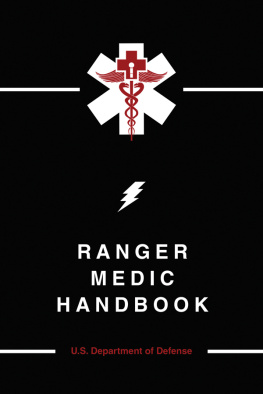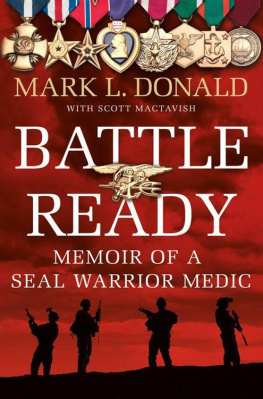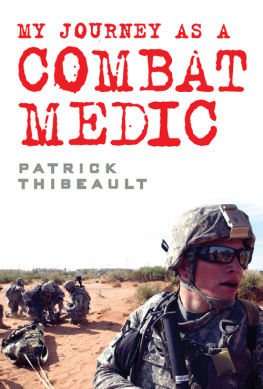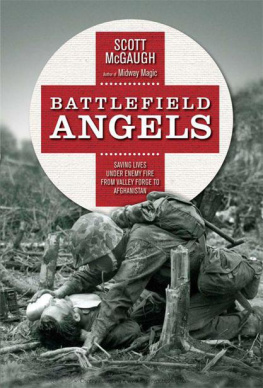Acknowledgements
There are many people who gave us their time and expertise as we wrote this book. Hundreds of medics, nurses, doctors and stretcher-bearers told us their personal stories, often reliving traumatic events long since buried. We are grateful to them all. Sadly, we could use only a fraction of the stories we heard, but we hope we have done justice to you all.
Particular thanks also go to:
Major General Alan Hawley, Director General of Army Medical Services, whose support for this project ensured we had access to all levels of the military medical system.
Captain (Retired) Peter Starling, Director of the Army Medical Services Museum, Keogh Barracks, Aldershot, whose depth of knowledge of the history of military medicine was invaluable. He and his staff, especially the curator Derek Marrison, provided unstinting assistance during our visits to the museums amazing archive.
Colonel Tim Hodgetts, Honorary Professor of Emergency Medicine, University of Birmingham, who shared with us his considerable expertise in the changes in military emergency medicine in recent years, told us of his own experiences in the front line and cast his expert clinical eye over the manuscript.
Squadron Leader Damien van Carrapiett at RAF Air Command, who provided invaluable assistance, recounting his own experiences and putting us in contact with numerous serving and retired personnel.
Wing Commander Mike Priestly, Commanding Officer of the Defence Medical Services Training Centre, and his excellent staff, for allowing us to join them on one of their intensive training exercises.
The administrators and members of the Army Rumour Service and Rum Ration websites, for access to inside information, contacts and expertise. The good-natured banter of all those involved was a welcome reminder of the strength of character and camaraderie of our military personnel.
Frank Garside from the British Limbless Ex-Servicemens Association, Major (Retired) Marie Ellis, Regimental Secretary Royal Army Medical Corps, and Captain Bill Anderson of the Queen Alexandras Royal Army Nursing Corps, all of whom provided contacts to many serving and retired personnel.
Cathy Pugh, General Manager of the Second World War Experience Centre in Leeds, who searched out accounts from the centres archives, and Rod Suddaby of the Imperial War Museum, London.
Patrick Bishop, Max Arthur and Hugh McManners for allowing us to tap into their knowledge and expertise of the Falklands war and operations in Afghanistan. Paul Carter for his matchless critique of the manuscript. Sarah Helm, David OReilly and Brian Mac-Arthur for help and encouragement.
Group Captain Andy Bowen, Mark Pillans, Sam Harrison and Laura Kerr at the Ministry of Defence, who facilitated contact with serving military personnel and clearance for them to tell their stories.
Our agent Mark Lucas and our editor Eleo Gordon, and the team at Penguin Books.
Finally, and perhaps most importantly, our wives, Suzannah and Sarah, for their constant love, support and advice.
By the same authors
Home Run: Escape from Nazi Europe
The Last Escape
Tail-End Charlies
Also by John Nichol
Tornado Down (with John Peters)
Team Tornado (with John Peters)
FICTION
Point of Impact
Vanishing Point
Exclusion Zone
Stinger
Decisive Measures
Also by Tony Rennell
Last Days of Glory
When Daddy Came Home (with Barry Turner)
1. Eric Harden VC. This was taken in 1940 and sent to his wife inscribed, To Darling Maude From Eric xx
2. Eric Hardens widow Maud and their son Bobby at the Victoria Cross investiture at Buckingham Palace, 9 April 1946
3. The telegram sent to Maud Harden informing her of Erics death, 29 January 1945
4. Thailand, August 1945. An emaciated British prisoner at the hospital camp at Nakhon Pathom. If the Japanese had not surrendered on 15 August he could have died within days
5. Jungle medicine in a bamboo hut lined with mosquito netting. One POW, Jack Chalker, made this drawing as a tribute to two legendary doctors: Weary Dunlop (with moustache) and Jacob Markowitz. They never actually operated together, but they were loved by all their patients
6. Wounded soldiers arriving home from France in summer 1944. The evacuation teams had to make use of whatever transport facilities were available
7. British and Canadian forces help a wounded soldier in a forest clearing in the Nijmegen area, Holland, February 1945
8. Falklands, 1982. Surgeon Commander Rick Jolly during a TV interview with ITN journalist Jeremy Hands at Ajax Bay. Jolly had just told Hands about the unexploded bombs in the field hospital
9. 3 Para medical personnel treating Argentinian wounded at Mount Longdon. Captain John Burgess is on the right at the rear, with Private Kennedy holding the drip
10. Major Roger Nutbeem, who died aboard Sir Galahad, and his young daughter Kathryn
11. Kathryn Nutbeem, waiting to sing at the ceremony commemorating the 25th anniversary of the Falklands War in June 2007
12. Survivors of the Sir Galahad coming ashore at Fitzroy
13. A medical assistant at Ajax Bay field hospital applies Flamazine to a burned Welsh Guardsman from Sir Galahad
14. RAMC Medic Eleanor Dlugosz, killed by an IED in Iraq, 5 April 2007
15. Sergeant John Jones, killed by an IED in Iraq, 20 November 2005. Holly Percival was one of the first medics on the scene
16. Medics of 4 General Support Regiment provide medical attention to the father of a young Iraqi child, Basra, 2003
17. Colonel Tim Hodgetts briefs the medical team as casualties arrive after an incident in Afghanistan
18. British medics evacuate an injured Iraqi soldier from a forward operating base in southern Iraq, 26 March, 2003
19. RAF fire crews in Afghanistan race to a Chinook helicopter to help unload casualties as ambulances stand by
20. The MERT after an operation in Afghanistan. Flt Lt Damien van Carrapiett is third from left and Sgt Rachel McDonald is far right. The Afghan interpreters face has been disguised for security
21. Falklands, 1982 the 2 Para Regimental Aid Post during the battle for Goose Green. The smoke is caused by burning gorse set alight during the attack
22. Afghanistan, 2006 3 Para doctor Captain Harvey Pynn treats the wheelbarrow casualty during the battle at Now Zad
23. Falklands the medical notes sheet from a casualty treated by 2 Para doctor Steven Hughes during the battle at Goose Green. The notes are clearly stained with blood
24. RAF Sergeant Rachel McDonald aboard the MERT helicopter in Afghanistan. Rachel was awarded the Paramedic of the Year 2007 award for her courage during a mission to evacuate mass casualties from FOB Robinson
25. Private Holly Percival during her tour in Afghanistan, 2009. Holly was part of the medical team sent to the IED incident in Basra, November 2005, where Sergeant John Jones was killed
26. Iraq, March 2003 an RAF medic tends to two British marines from 42 Commando after they were injured during the conflict. The Puma helicopter crewman keeps a constant vigil, checking for threats from the ground
27. Iraq, September 2005 a soldier escapes from a burning Warrior during the incident at a Basra police station where two undercover SAS soldiers were being held captive
28. RAF Flight Sergeant Frank Mincher, far right, treating other casualties in an ambulance during the same incident in Basra
29. Troops under attack at the police station in Basra
30. Surgeon, Lieutenant Colonel Paul Parker attends to the smallest casualty of his time in Afghanistan. Parker also operated on Sergeant Major Andy Stockton
31. Flight Lieutenant Andy Smith after an emergency evacuation mission in Afghanistan, 2009. Medical kit is positioned for easy access on his body armour

